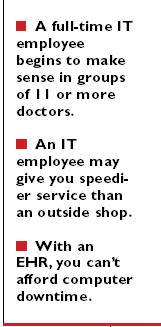Article
Technology Consult
Expert help: Hire or outsource?
Goodbye, medical records clerk. Hello, computer specialist. The emergence of the electronic health record is eliminating some positions in physician offices and creating new ones.

Experts say you can't rely on the average office manager to perform advanced IT tasks such as setting up a shared printer for multiple workstations, or replacing a hard drive. And you may not find that kind of technical support available from software and hardware vendors or the value-added resellers they sometimes work through.
Small practices might make do with a part-timer It would be a rare solo physician who would either need-or could afford-a full-time computer pro on staff, even if he or she did use an EHR. But once a practice goes beyond 10 doctors, hiring such a person isn't so farfetched, experts say. That rule of thumb is borne out by the Medical Group Management Association, which reports that practices of 11 to 25 full-time equivalent doctors field eight one-hundredths (0.08) of an IT employee for every FTE doctor. Do the math, and you'll see that an 11-physician group would nearly have a full-timer in an IT role.
Solo FP Arlene Brown in Ruidoso, NM, gets along fine with a part-timer. He works two hours for her every weekday, says Brown, whose paperless practice includes one nurse practitioner and two physician assistants. "He's done everything from installing hardware to troubleshooting system slowdowns." It's a second job for him, she adds; he's also the IT chief for a local mental health center.
Phil Yount says his small practice initially needed a full-timer to launch its EHR system, but now that things have settled down, the employee's workload has tapered off to about 13 hours a week. "We pay him one-third of a full-time salary and farm out the rest of his hours to other medical practices," says Yount.
You need someone who knows networking What should you look for in an IT employee? More than anything, this person should know how to network computers and related hardware and keep the system lit up and happy. Prime credentials include an MCSE, or Microsoft Certified Systems Engineer, and an MCSA, or Microsoft Certified Systems Administrator. Look for a congenial generalist who can clear a paper jam as well as teach a neophyte how to download an e-mail attachment. The congeniality part may be hard to find: "Many tech people are used to interacting with machines, but not with people," says computer consultant Ronald Anderson in Escondido, CA.
And your candidate may not come cheap. By all accounts, you can expect to pay IT employees anywhere from $30,000 to $70,000 a year, depending on their qualifications, job description (do they oversee anyone?), and where you practice.





